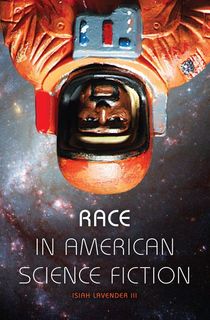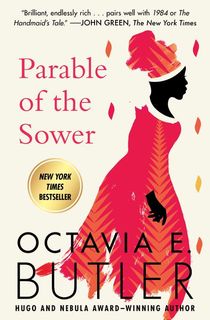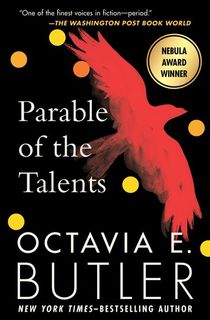Isiah Lavender III is a professor, author, and editor whose work focuses on race in science fiction. He's written numerous books, including Afrofuturism Rising: The Literary Prehistory of a Movement and 2011's Race in American Science Fiction. In the latter work, Lavender explores what he calls the "blackground" of sci-fi through the concept of otherhood.
Race in American Science Fiction analyzes everything from TV shows to novels, and takes a thorough look at the work of Black authors like Samuel R. Delany and Octavia E. Butler. In the excerpt below, Lavender highlights Butler's novels Parable of the Sower and Parable of the Talents, and examines the series' depiction of race in the wider context of the sci-fi genre.
Read on for an excerpt, then download the book!
Science fiction produces alien and divergent neighborhoods, with strange and dissimilar signs, shifting identities, and distorted realities of existence. For example, Octavia Butler’s Parable of the Sower (1993) is a dystopian novel set in the not too distant future around the city of Los Angeles, where downward spiraling middle-class people live in interracial walled communities for protection against the decaying and regressing social order of twenty-first-century America. This sf narrative takes the form of an autobiographical journal relating Lauren Olamina’s intimate experiences of the world as her community crumbles around her. She begins a new religion, Earthseed, where “God is change,” as she flees north through the ensuing anarchy and violence with her multiracial band of survivors, encountering various situations, ranging from gunfights and cannibalism to escaped slaves and wildfire (Sower, 3). Ultimately, the destiny of Earthseed is to take root among the stars (Sower, 199). Butler’s story is of great consequence to readers because she explores the psychological and spiritual repercussions of racism on a disintegrating country that illustrate the importance of examining attitudes, assumptions, and feelings by which society has conditioned everyone.
Lauren is afflicted with hyperempathy syndrome, a congenital disease passed to her from her mother, an abuser of a drug called “Paracetco, the smart pill” (Sower, 11). Hyperempathy syndrome is a delusional ailment, which causes Lauren to experience the pain and pleasure of others around her. This illness creates in her a profound sense of compassion, allowing her to fight the sense of hopelessness and indifference surrounding her. It grants her the wisdom to lead people. In this light Lauren learns to value community and all it offers—solidarity, activism, and self-reliance. She and her followers must learn, teach, adapt, and grow. As Butler writes: “Embrace diversity. Or be destroyed” (Sower, 181). And so by embracing all that her community is, Lauren adapts, in the Darwinian sense, in order to survive.
Butler and other sf writers like her use sf to move us outside of our normal comprehension and allow us to see how race operates culturally. This kind of writing takes us beyond the scope of our ordinary experiences and forces us to mediate between what we already know about race and what we can learn about it by reading sf. The means to accomplish this kind of mediation relates to concepts of otherhood. And in terms of the black/white binary, sf authors would do well to examine settings, signs, and characters, even themselves, based on how otherhood fits science fiction. Butler does understand these relations, and her Parable books present a bleak, nightmarish view of a possible future in alarming detail—where there is unchecked violence and crime; the rapid spread of drugs like pyro, which induces people to start fires; gangs, drug addicts, and homeless people dominating the streets; greedy multinational corporations buying up pieces of the country; federal deregulation of minimum wages, which allows (debt) slavery to make a comeback; escalating energy, food, and water prices; spreading hunger; a corrupt, lazy, and ineffectual police force; simple diseases such as measles and cholera raging out of control; an exponentially increasing birth rate; global warming; a growing gap between the rich and poor; declining educational systems; polygamy; the failure of moral teachings from various religions, most especially Christianity; the decay of modern communication technologies such as television and dependence on older technologies such as public radio for world news; dismantling of the space program; rusting cars, guns and fire—literally social chaos caused by a convergence of social, environmental, and economic crises. As Peter Stillman describes it, “The United States is no longer the storied land of freedom and plenty” (18). In other words, twenty-first-century American life is a living hell.
Though Butler’s second novel is complicated by dual narrators, Lauren and her resentful daughter, Larkin/Asha Vere, Parable of the Talents (1998) continues the story of Lauren and her fledgling Earth-seed religion, where “change is the one unavoidable, irresistible, ongoing reality of the universe” (75). The U.S. is dominated by lawlessness, violence, slavery, and religious fanaticism, among other things. Lauren’s missing brother, Marcus, is back from the dead and rescued from slavery. Later, the first Earthseed community, Acorn, is destroyed; Lauren and her followers are enslaved with electronic “slave collars” by brutal extremists known as the Church of Christian America (Talents, 189); her husband dies in the reeducation camp that Acorn becomes; and her baby daughter is kidnapped and conditioned. Yet somehow Lauren manages to survive and spread the teachings of Earthseed. As the story comes to its end, Lauren is revered as a deity, but she is estranged from her now grown daughter as well as from her brother, a prominent minister in Christian America and an opponent of Earth-seed. Lauren dies before the first Earthseed ship rockets into space, but her ashes are sent with the crew to seed the stars. The second Parable novel is possibly greater in consequence than the first because Butler makes visible the strength and perseverance necessary to unlearn racist patterns and resist oppression. Here is a writer attempting to come to terms with the hurts suffered as a result of racism.
With its depictions of slavery, concentration camps, and religious zealotry, Parable of the Talents addresses issues of racism and persecution far more directly than its predecessor. The “potential” of Earth-seed to overcome differences such as race or class or sexual preference is a part of the struggle for survival (Talents, 361). The promise of human diversity is knotted with the “apocalyptic potential” of “the current racial formation of American society” (Phillips, 306). Butler embeds her critique of racism in the background of the text in such a way that the ability to reason, create technology, and use scientific advances is the only plausible means to potentially survive and progress beyond the evolutionary dead end of discrimination. As described by Patrick Sharp, “The key to Darwin’s vision of evolution was technology: [Darwin] argued that humans had been naturally selected for their ability to invent and use technology” (4). Capitalizing on this sentiment, Butler’s writing estranges reality in such a way that addresses concerns about our lack of preparedness for change as a society and as individuals. As Lauren declares, “If we’re to be anything other than smooth dinosaurs who evolve, specialize, and die, we need the stars” (Talents, 179). Leaving Earth is the only solution to the coming race war that Lauren is able to envision. The Parable books are politically poignant because many people are afraid to look at reality; instead, they close their eyes and hope it will go away or become better. It is in sf writing such as Butler’s that we see a need for the necessary critical tools to interrogate a genre permeated by racial assumptions.

Butler’s Parable books are important to science fictional race discourse in many ways. First, she offers an incisive critique of race and class in postmodern culture by creating the walled community of Robledo, which happens to be an interracial mix of blacks, whites, Asians, and Latinos struggling to survive together in the midst of social, economic, and environmental crises. Butler’s use of diversity shows us that embracing human differences would eliminate many of the difficulties that we face today because it would dismantle the problem of the color line as society restructures itself. Second, Butler promotes the importance of building a community through thinking, teaching, and activism, where diverse groups of people work together to solve current social problems created by distrust, prejudice, hate, and greed in conjunction with separatism. As Madhu Dubey acknowledges, “The process of finding unity in diversity is necessarily risky and difficult, requiring the ability to interpret unfamiliar cultural codes and the alert balancing of suspicion and trust typical of urban social interactions” (“Folk,” 113). Third, through questioning dominant social paradigms and dismissing them, Butler undermines racial coding in sf with a black woman protagonist without explicitly talking about race. Her work is an effective counter model against racist images presented in the works of white writers, and lends itself nicely to investigating the obvious tensions between these competing representations.
Want to keep reading? Download Race in American Science Fiction today!
This post is sponsored by Open Road Media. Thank you for supporting our partners, who make it possible for The Portalist to celebrate the sci-fi and fantasy stories you love.



